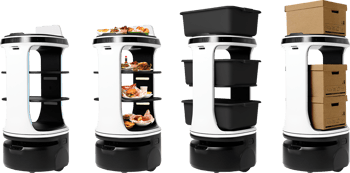Even before the pandemic, the restaurant industry was known for high turnover. And now, the industry faces a full-on hiring crisis, making it more essential than ever to keep the talented staff you’ve attracted. But how?
Strategies to create a more desirable working environment are varied, from increasing wages and benefits to fostering a positive culture that could include everything from mentorships to paid continuing education to flexible scheduling and vacation time. And yet, change, especially in the current environment, is often challenging. So where should you start?
We spoke with 10 restaurant operators who’ve seen success to find out what steps they’ve found as the most important for building and retaining a dedicated team.
Carl Sobocinski, founder and president of Table 301 Restaurant Group in Greenville, South Carolina
I believe in taking care of employees the same way we take care of our guests. We aim to create an environment of opportunity. I’m always ready to continue to feed that next generation of entrepreneurs. Once they get to the executive chef or manager level, their opportunities become more scarce for growth so we start turning them over to become a partner. Over the last few years, that's exactly what I've begun to do. Since 2019, three of Table 301's existing concept restaurants have been turned over to Table 301 employees through a gradual buy-out. We provide the knowledge, industry connections, marketing support, financial support and consumer trust to help them own the restaurant. This initiative is something we encourage all Table 301 employees to work towards.
Offering unique benefits have also been key to retaining quality employees. As we've seen housing costs steadily increase, some of our staff cannot afford to live comfortably. Table 301 introduced a housing cost supplement program by partnering with a local developer, offering a $200 monthly rent subsidy for select employees. From dishwasher to general management, this program – which has had more than 16 employees participate – has helped to retain quality people.
Meghan Lee, owner of Heirloom in Lewes, DE
I believe that retaining staff starts with the first step – hiring the right person. If and when we are looking for someone to join our team, I am very selective in the process. There has to be an instant compatibility in our initial conversation – what are they like? What do they do with their time when they aren’t working? And one question I always ask, “Do you or did you play sports?”. I feel like someone who has played a sport understands what it’s like being a part of a team. They understand endurance and stamina during long games, or, in our case, long work nights, and they know how to finish or get to the end and win a great and successful dinner service.
Once we go through an interview process, where this potential candidate has met multiple people on staff, I have both a BOH and FOH “stage”, where they come in for a night of service and bounce around the stations of a restaurant – host stand, food runner, the bar, the servers, the kitchen, etcetera. My staff is queued to ask the potential candidate questions, and truly dig deep with where this person’s passion lies. I think it’s important to do the work upfront, really putting in the effort to know the person who potentially might be a part of your team and family.
With that said, once you are onboard and a part of the Heirloom squad, I fully invest in you – your future, your goals, your accomplishments, your strengths and weaknesses.
I have been extremely lucky and successful with retaining my current staff. I am constantly mentoring my staff [through] weekly meetings, menu changes, updates, and holding them accountable when they say they will do something or make something. I invest in my staff, [with] bi-yearly trips to "food" cities, restaurant excursions to taste other restaurants' menus and/or wine pairings, cooking at the James Beard house, and paying them when we close for four weeks in January. [We also] dropped down to a five-day workweek where everyone has two back-to-back days off to be with family and friends, and [do] fun activities like escape rooms and pizza every Saturday night. Most importantly, if someone needs off, the answer is always “yes”. It can be for a very personal reason or just a break, but I never ask or never give a hard time about why they cannot work. It is up to me to find ways to support my staff no matter what. I am very lucky, very grateful, and love my staff.
Ellen Yin, co-founder of High Street Hospitality Group in Philadelphia, PA
Building a culture that fosters employee retention I think has to do with creating an environment where people belong and see opportunity for themselves. We have one person dedicated to screening every candidate that expresses interest in our group. We allow them the opportunity to tell us about who they are, what their interests are, and we try to identify whether there is a good cultural fit. All current employees meet with this manager to make sure their personal goals are being met in terms of growth and development, and a plan is created so that we know what their career trajectory could look like. Even if their long term goals are outside of the restaurant, we look to see how we can assist them. Other than that – paying attention to schedule requests, proper training, making sure that people’s time is respected, benefits of course, and [we create] an employee newsletter to make sure people are connected.
Ron Hsu, Chef-Partner of Lazy Betty and Juniper Cafe in Atlanta
Since day one, we’ve implemented a service charge. That helps our staff, especially the waitstaff, be able to gauge how much they’re going to make. Once you work in a restaurant long enough, you can guess how much the average spend is per customer, and so our price structure includes a 20-percent service charge. So you know, if we’re charging $5 for an appetizer, it’s really $4, and then that $1 is the 20-percent that gets split amongst the rest of the restaurant. The total tip amount ends up being about 30%, and servers like that because they know they’re going to get a good tip, and that also compels them to give better service.
Since it’s a service charge and not a gratuity, we’re allowed to give to the back of the house as well. If it’s beverage,100-percent goes to the front of the house, but if it’s food, we give 10-percent of the service charge [to the back of house] and a little higher for takeout orders.
We also try to make sure we provide a good work-life balance. Our servers, unless they want to, generally only work 30 to 35 hours, and they’re able to make a living working less hours. With the back of the house, for chefs, we want to make their work relevant, so that they can improve their trade skills. We’re teaching them how to break down a whole fish, or whole poultry, not just take something out of a box and microwave it. Career-minded chefs want to learn how to do things from scratch. And if you empower your cooks to make something from start to beginning, they not only learn more, but they care more.
It’s also important to hold your staff to a certain level of quality. When there’s a goal, and they can achieve it, people like that. When people are held accountable, you instill a sense of pride in their work. Every food item that leaves our kitchen is always inspected by a chef. If there’s something that could be better, we let them know. “Hey you need to work on this, make sure you get a better sear on the steak,” for example. If you’re not giving feedback, you’re not being fair to the cook, you're not helping them to improve.
Jeremy Edmonds, director of people and culture for Snooze, a nationwide breakfast chain
At Snooze, caring shows up in how we lead, our culture, and providing support when someone is in need. In 2018 we launched the Snooze Compass Foundation, a 501(c)3 which is funded by Snoozers, run by Snoozers, and provides financial support to our Snoozers when faced [with] unforeseen hardships. Since its inception, the Foundation has provided more than a half million dollars in support to our Snoozers.
Retention is driven by our commitment to our culture. Our focus on the core principles of engagement (feedback, listening, development, reward/recognition, and culture), plus our commitment to operational excellence creates the foundation. Connecting our Snoozers to our communities and making an impact on the planet is [also] an important driver in our retention strategy. Programs like our annual Earth Day celebration, where we plant a tree for every Snoozer, providing every Snoozer with paid time off to volunteer, and donating one-percent of our revenue to local nonprofits which are selected by our Snoozers have led to higher retention and interest.
Chef Pepe Moncayo of Cranes in Washington D.C.
I believe we can do much better for our employees. Where I come from in Spain, working rights are much more, shall we say, benevolent, than they are here. Medical [insurance] is free – I mean we pay with our taxes, but medical care is really good. For my employees, providing medical [insurance] and to subsidize 50-percent of the insurance is the least I can do. And for me, it’s shocking that that’s not done throughout the whole industry. In the future, it would be great to subsidize even more, but we are living in a moment where we are trying to survive.
Insurance is important, but honestly I think the most important thing is also the culture you implement and how you work with people. I believe in giving opportunities to the people who are working with you and am very quick to promote within rather than looking externally. We run with respect and compassion. I had this couple, for example, who’d been working in the industry for a long time, and when they joined me, they asked if they could take a Saturday and Sunday off. They said, “I know it’s a really busy time”, but they needed to be with their children before school started. And I said, “Of course," and I told them I’d pay them for it. And they were honestly shocked. But that’s their right. You accrue time off for every hour that you work. Building human relationships with your people, showing respect, and simply being understanding – it matters.
Tal Baum, founder and proprietor of Oliva Restaurant Group in Atlanta, GA
We really focus on creating a wonderful work culture. An integral part of our business model is prioritizing employees’ quality of life and wellbeing. We have high standards and demand a lot from employees, but at the same time, we really respect work-life balance. Managers typically don’t work more than 45 to 50 hours each week, which is incredibly rare in the restaurant industry. We also give managers the tools and support needed to create balance and a great culture and prioritize how employees are treated.
We offer paid sick days, paid time off, 401K plan with employer contributions, health insurance, and meal benefits. Plus, we're understanding of family circumstances when scheduling, and provide mental health support and mentorship. On the professional development side, we invest into mentorship and development. The group offers a continuous education program where each manager has a stipend to invest in their personal education, whether that's purchasing books, taking a course, going on a research trip, etcetera. And because we have a great, dedicated team, we've been able to grow the number of concepts we have, and in turn employ more people in Atlanta. Today, we have more than 300 employees across five concepts, with one more restaurant opening later this year.
Alex Smith, CEO of Atlas Restaurant Group in Baltimore, MD and surrounding region
We make sure to do a great job with benefits. We pay 50% of all medical insurance, and we do things like life insurance and pet insurance. Unfortunately in a company of our size, we have had an employee pass away, and our life insurance policy gives $50,000 to their family. It’s these added benefits that have helped us to retain.
We also do a $15 hour minimum wage with tip credit. If you’re a server, you make the state’s minimum wage, but we guarantee a $15 minimum wage in that if a server, busser, or runner, is making below $15, even with the tip credit, then we bump them up. Our starting wage for entry level positions, such as dishwashers or hostesses, start at $15 an hour. And that seems to be working for us.
We also try to give our employees as much opportunity to grow within our organization as possible. The CEO of our company started as a manager with us in our first store, and you see it all the time where a dishwasher becomes a line cook, a line cook becomes a sous chef, and a sous chef becomes an executive chef. Employees that start with us at $15 an hour when they come into the company have an opportunity to be making six figures as an executive chef at one one of our properties. We're a growing organization, and people are moving up the ladder, and people are seeing that.
Once a year, we also do a listening tour. We have a third party who speak with our key staff members at every single position. So we'll take leaders from the back of house, front of house, and the management team and get real-time feedback. Then we'll sit down from a corporate level and figure out where we could be doing better, and then we respond. This allows us to really get down to the nitty gritty at the store level, to figure out how we can be a better organization. It's a process of getting constant feedback from our hourly employees on what we can be doing at a corporate level to make the business more successful, and not only that, but to create a better environment.
Nicole Marquis, founder and CEO of HipCityVeg in Philadelphia, PA, New York City, NY, and Washington, D.C.
Employees especially want to know that they are valued, that they have opportunities to grow, and that they are working for a company that cares about them and others. We go through a thorough hiring process to make sure that people who come to work for us are looking for an opportunity to build a career, and in our training and orientations, we make sure that they know what HipCityVeg stands for, which is our triple bottom line: People, Planet, and Profit.
Once they are working for us, we have created layers to help them grow, give them feedback, and listen to their ideas and concerns. Frequent and open communication is key. That’s why we have so many people who stay with us for years and grow from hourly positions to management positions. That’s also why so many people who do leave make their way back to us. We always let them know that our doors are open, and we even create positions for people to give them opportunities to advance and grow. We have a relatively new general manager in New York who recently told us that for the first time, he leaves work every day with a smile on his face, and he said sometimes he used to leave work feeling deflated or even crying. That’s almost as important, if not more so, than a fair salary, benefits, and opportunities, which we also do provide – feeling like you are valued, cared about, and are contributing to something bigger, like a better, healthier world.
Amy Morton, owner of Found Kitchen + Social House, The Barn Steakhouse, and Stolp Island Social in Chicago
At the top of our list, nothing matters more than culture – culture both inside and outside the restaurants. We have strived to support our players in finding and creating the balance between home and work that is necessary to find pleasure in both. We do this by managing scheduling in a way that suits the player. Due to the lack of labor right now, this is extremely different, and in fact at times, it could seem it is put far above the business – we’ve had to close various locations for numbers of shifts since reopening from Covid as we have such limited staff.
In the old days, restaurants would just have the team suck it up – work more than requested or else – to maintain operations. This is something that is a “lose lose”, if it were to continue. The team would eventually burn out [and] feel so unsupported [that] they’d eventually quit or simply have a negative attitude in the dining room, which is awful for morale. Vacation time goes hand and hand in this as well – not only do we offer far more time off than the vast majority of restaurants, but we also insist our team take this time to unwind. As they continue to work, they earn paid time off. They can accrue up to 40 hours per employment year. Tipped employees are paid minimum wage and hourly employees are paid their normal rate of pay.
[Photo by Ketut Subiyanto from Pexels]





